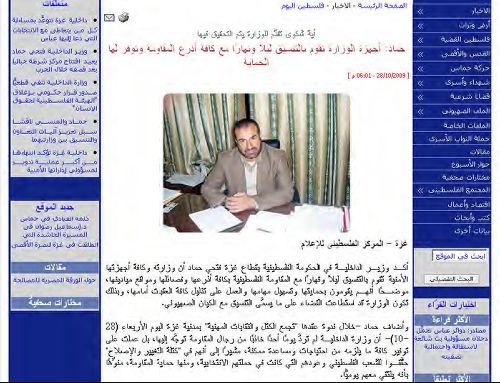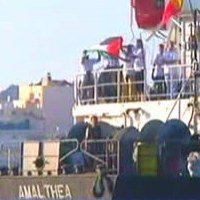The interior minister of the de facto Hamas administration describes the support his office gives the terrorist organizations operating in the Gaza Strip. His description contradicts the claim the Hamas administration made to the Goldstone Committee, according to which it had no direct or indirect links to the terrorist organizations.
Translation of the first two paragraphs of the article regarding coordination between the de facto Hamas administration interior ministry and the “resistance”
Gaza – Palestinian Information Center
28/10/2009
The interior minister of the Palestinian government in the Gaza Strip, Fathi Hamad, confirmed that his ministry and all its security apparatuses work day and night in coordination with all the wings, factions and ground positions of the Palestinian resistance. He said that they operate to protect them and make it easier for them to carry out their missions, and work to remove all obstacles in their path. Thus the (interior) ministry succeeded in destroying what was known as “coordination with the Zionist entity.”
During a seminar held by the Association of Factions and (Trade) Unions in Gaza City on Wednesday, October 28, Hamad added that the interior ministry had never refused anything to members of the resistance who appealed to it. Quite the opposite, (the ministry) provided for all their needs and gave them all possible assistance. He said that the Change and Reform Faction (i.e., the Hamas faction in the Palestinian Legislative Council) had kept all the promises made to the Palestinian people during the election campaign, including that of protecting the resistance, noting that he met with them (i.e., operatives of the terrorist organizations) on a daily basis.
1. On October 28 Fathi Hamad, interior minister of the de facto Hamas administration, gave a speech at a conference in Gaza City sponsored by the Association of Factions and (Trade) Unions. In his speech he described the close ties between Hamas’ interior ministry and the terrorist organizations operating in the Gaza Strip (“the resistance factions”), and the support it gave to the various organizations. The conference was attended by commanders of Hamas’ internal security forces operating in the Gaza Strip.
2. The following were the main points quoted by the Hamas-affiliated Safa News Agency, October 28, 2009:
a) The (Hamas) interior ministry “coordinates with all the factions of the resistance in (the) Gaza (Strip)” (i.e., the terrorist organizations).
b) The ministry makes every effort “to protect them and make it easier for them to carry out every aspect of their jihadist missions.”
c) There is routine coordination between the interior ministry and the various organizations: “We routinely meet with the commanders of the factions (i.e., the terrorist organizations) to remove obstacles between us. We have ended the security coordination with the occupation (i.e., the Palestinian Authority’s security coordination with Israel) and have replaced it with jihadist coordination” (i.e., operational coordination to carry out terrorist attacks against Israel).
3. Fathi Hamad, as Hamas’ interior minister, has a great deal of influence on the implementation of Hamas’ terrorist attack policy. That is because the internal security forces are subordinate to the ministry and serve as Hamas’ main tool for enforcing its policies, and are used by Hamas to supervise the extent, nature and number of terrorist attacks. His statements were intended to deflect Fatah’s accusations that once Hamas won the elections to the Palestinian Legislative Council in 2006, it abandoned the “resistance” and has since prevented the military-terrorist networks of Fatah and the other organizations “from resisting the occupation” (Safa News Agency website, October 28, 2009).
4. Senior figures in the Gaza Strip and in the Hamas movement have repeatedly stated that the de facto Hamas administration in the Gaza Strip and its security forces are committed to supporting the terrorist organizations (the “resistance”) and their attacks against Israel from the Gaza Strip. For example:
a) Ismail Haniya, head of the de facto Hamas administration, said in an interview that the administration reserved the right to use “resistance” (i.e., terrorism) to establish a Palestinian state. He said the administration was trying to conduct the civilians’ daily lives but without running the risk of waiving the Palestinians’ so-called “rights,” and was backing the “resistance” project (Hamas administration publication Al-Ra’i, July 13, 2009).
b) The late Sayid Siyam, former interior minister killed by the IDF during Operation Cast Lead, when chosen as minister stated that he would not hinder the “resistance” operatives (i.e., terrorist operatives). He said that the “resistance” (i.e., the terrorist organizations) was “a legitimate right of the Palestinian people” (Ma’an News Agency, March 24, 2006). Fathi Hamad, who inherited the position of interior minister, listed his predecessor’s “achievements:” “One of his greatest achievements,” he said, “was creating cooperation and coordination between the current security forces and the Palestinian resistance…and (creating) collaboration against the Zionist enemy…That is why (the enemy) bombed the headquarters of the security forces (during Operation Cast Lead)” (Hamas police website, May 7, 2009).
c) At a meeting with Egyptian intellectuals and diplomats, Musa Abu Marzuk, deputy head of the Hamas political bureau in Damascus, was asked about the claim that following the establishment of the de facto Hamas administration in the Gaza Strip, there was a decline in the “resistance” (i.e., terrorist attacks). He answered that the opposite was true: “This is the first time since the Oslo agreements that a Palestinian government has supported the resistance (i.e., terrorism), does not persecute resistance activists, does not detain them and does not make it difficult for them to operate.” He boasted that since the establishment of the de facto Hamas administration, there had been showcase attacks against the “Zionist entity,” one of which entailed the capture of a “Zionist soldier” (Gilad Shalit). He was asked about the decline in suicide bombing attacks during the same period, and answered that “there is a difficulty in carrying them out because of the separation fence and the gates surrounding the residents of the West Bank” (Ikhwan Online website, June 2, 2007).
5. The statements made by the interior minister in the de facto Hamas administration and other Hamas figures quoted above expose the contradiction between the Goldstone Report and the strategy and actions of Hamas. The Report rejected out of hand Israel’s position that the de facto Hamas administration (“the Gaza authorities,” according to the report) was part of the “Hamas terrorist infrastructure” (Page 11, Paragraph 32). The Report completely distinguishes between the so-called “Gaza authorities” (i.e., the Hamas administration) and the so-called “Palestinian armed groups” (i.e., Hamas’ Izz al-Din al-Qassam Brigades and the other terrorist organizations operating in the Gaza Strip).
6. The Goldstone Report quotes the claims made by the de facto Hamas administration in the Gaza Strip that there are no direct or indirect connections between it and the Izz al-Din al-Qassam Brigades, and that it has no idea of what tactics are used by the “armed groups” (“The Mission also addressed questions regarding the tactics used by Palestinian armed groups to the Gaza authorities. They responded that they had nothing to do, directly or indirectly, with al-Qassam Brigades or other armed groups and had no knowledge of their tactics,” Page 134, Paragraph 439; and “…the Gaza authorities stated that they had ‘nothing to do, directly or indirectly, with al-Qassam or other resistance factions…’” Page 459, Paragraph 1668). Therefore, while it says that “the Mission emphasizes the obligation of the Gaza authorities to respect international law…, and is of the view that this requires the prevention and prosecution of violations of international law occurring within its area of de facto governmental authority” (Page 471, Paragraph 1715), it also relieves the de facto Hamas administration in the Gaza Strip of responsibility by making it the task of the “Palestinian armed groups” which have “have failed in their duty to protect and respect civilians” (Page 473, Paragraph 1721). While the Report does condemn the indiscriminate rocket fire of the “armed groups” attacking the civilians in the south of Israel, and calls it a “war crime” which may be considered a “crime against humanity,” it does not place responsibility on the Hamas movement and the de facto Hamas administration in the Gaza Strip, but rather on the “Palestinian armed groups” (Pages 473-4, Paragraph 1724).
7. The statements made above by the Hamas administration’s interior minister and senior Hamas figures clearly show that the Hamas claims adopted by the Goldstone Report have no basis in fact. They show that the interior ministry, which is part of the de facto Hamas administration, is in charge of supporting the terrorist organizations in the Gaza Strip and of directing their actions according to Hamas strategy. Thus all sectors of Hamas – the movement, the de facto administration and its military-terrorist infrastructure — are fully and directly responsible for rocket attacks against Israel (“a war crime” as determined by the Goldstone Report) and for turning the Gaza Strip into a breeding ground for terrorism.
Source: Intelligence and Terrorism Information Center
Mazzeltov,
Crethi Plethi



 RSS
RSS
















Latest Comments
Hello Mike, Thank you for your positive feedback to the article. I felt there wasn’t too much critical analysis of ...
Thanks for this considered and well constructed article. A follow up article on the manner in which the editorial contro...
THE CLUELESSNESS OF CLAIMING THAT OBAMA'S MIDDLE EAST POLICIES WERE A FAILURE CANNOT BE FURTHER FROM THE TRUTH, WHAT THE...
As long as Obama is the president of the usa do not trust the us government......
Thank you for an good read....